Every time I close my eyes and think of Inihaw na Pusit, I'm transported back to those perfect beach afternoons in Bagac, Bataan, where the gentle waves provide the soundtrack to our family's weekend escape.
This wasn't just any grilled squid recipe, this was the star of every beach trip, the dish that had everyone fighting over the last piece while colorful boats bobbed in the distance. I can still see Tatay manning the makeshift grill, the smell of charred pusit mixing with the salty ocean breeze, while we kids impatiently waited, toes buried in the warm sand, armed with banana leaves as plates and spiced suka ready for dipping.
This inihaw na pusit recipe brings that same magic to your kitchen: tender, perfectly grilled squid stuffed with a mouthwatering mix of tomatoes and onions, marinated in a sweet-tangy sauce that caramelizes beautifully over the flames.
Whether you're craving those beach trip memories or looking to level up your ihawan game, this Filipino grilled stuffed squid recipe promises that same smoky, succulent bite that makes everyone gather around the grill. One bite of this charred, stuffed pusit, and you'll understand why no Filipino beach trip is complete without it.
Jump to:
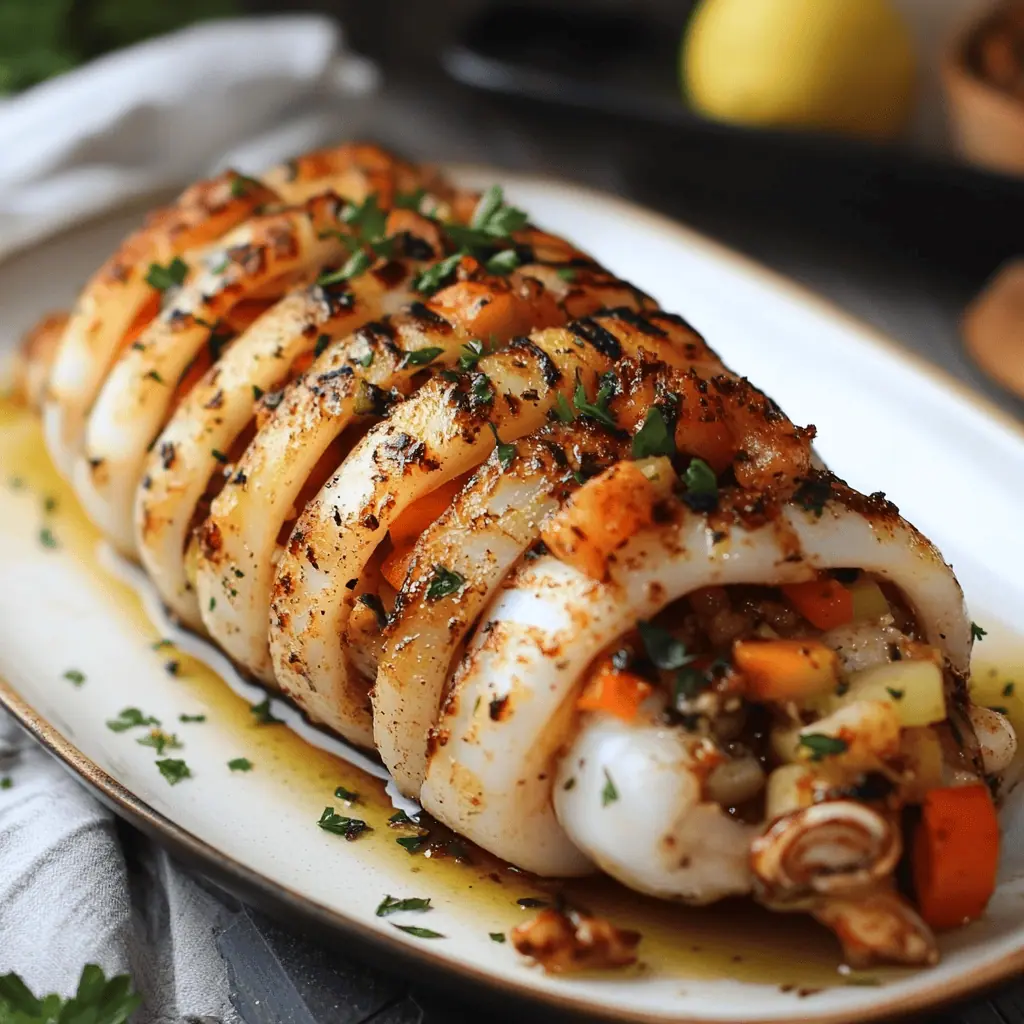
Why You'll Love This Recipe
- Restaurant-Quality Results: Learn the secrets to achieving that perfect char while keeping the squid tender
- Complete Guide: Detailed steps and pro tips ensure success even for beginners
- Versatile Dish: Perfect for both casual family dinners and special occasions
- Authentic Taste: Traditional Filipino coastal flavors with a modern twist
- Make-Ahead Friendly: Prep components in advance for easier cooking
- Budget-Friendly: Impressive results with affordable ingredients
Ingredients
This recipe showcases the perfect balance of Filipino coastal flavors. Fresh squid provides a tender, slightly sweet canvas, while the tomato-onion stuffing adds moisture and brightness from within.
The marinade combines honey and brown sugar for caramelization with vinegar for tenderizing acidity. Garlic, ginger, and Thai chilies create a bold aromatic foundation, infusing the squid with layers of flavor that intensify over the grill.
This combination represents traditional Filipino cooking philosophy: simple, fresh ingredients transformed through perfect technique, creating a dish where every element serves both flavor and function.
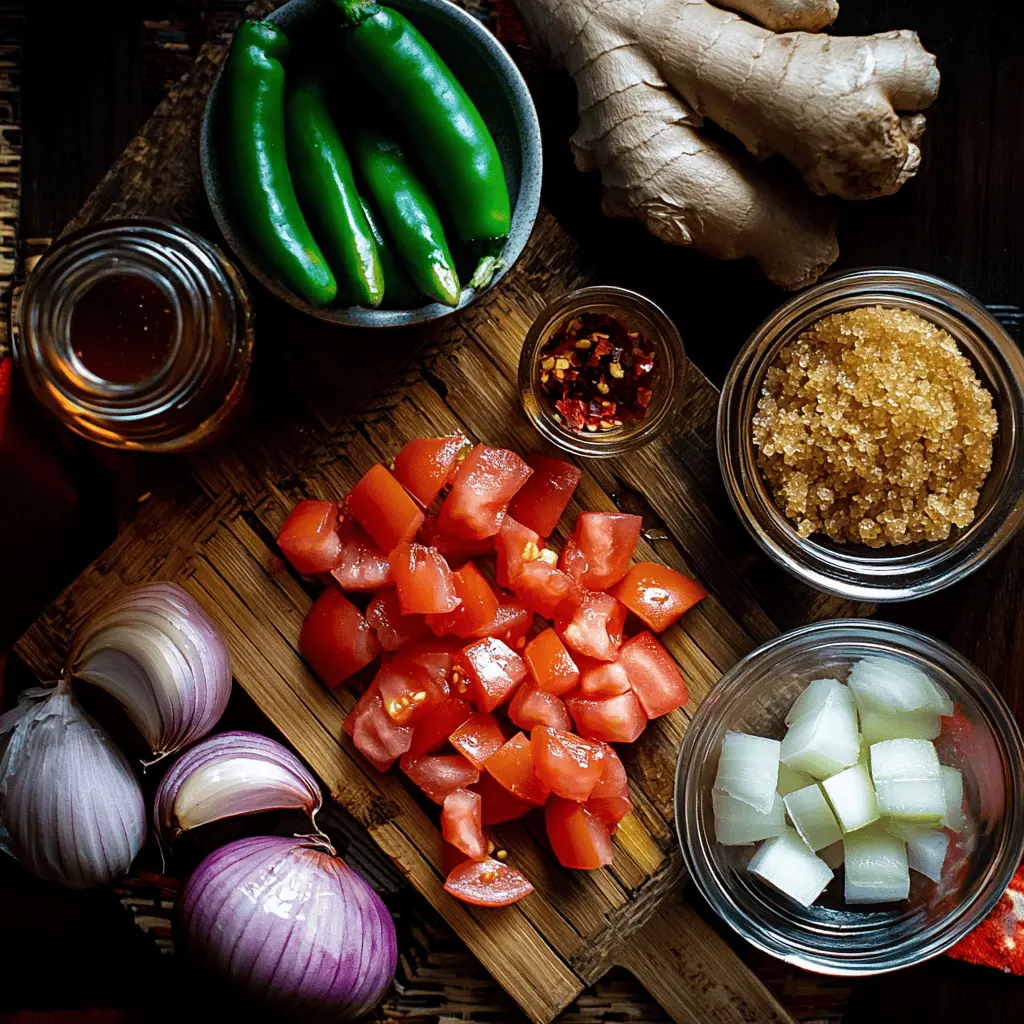
For the Squid:
- 2 jumbo squid (about 2 pounds total)
- 2 Roma tomatoes, finely chopped
- 1 red onion, finely chopped
- Salt and pepper to taste
For the Marinade:
- ½ cup honey
- ½ cup brown sugar
- ½ cup vinegar
- 5-6 cloves garlic, minced
- 1 thumb-size ginger, minced
- 2 teaspoons salt
- 3 Thai chili peppers, minced
Equipment
- Charcoal grill – Provides the authentic smoky flavor that defines this dish (gas grill works too, but lacks the same smoky intensity)
- Grill tongs – For safely handling and flipping the squid without puncturing
- Sharp knife – Essential for cleaning the squid and creating the diamond score pattern
- Cutting board – Preferably with a groove to catch squid juices
- Mixing bowls – Separate bowls for marinade and stuffing preparation
- Basting brush – For applying marinade during grilling to maintain moisture and build flavor
- Toothpicks – To secure the stuffing inside the squid during grilling
- Instant-read thermometer – Optional but helpful to ensure perfect doneness (aim for 60°C/140°F)
- Paper towels – For patting dry the squid before grilling to achieve better char
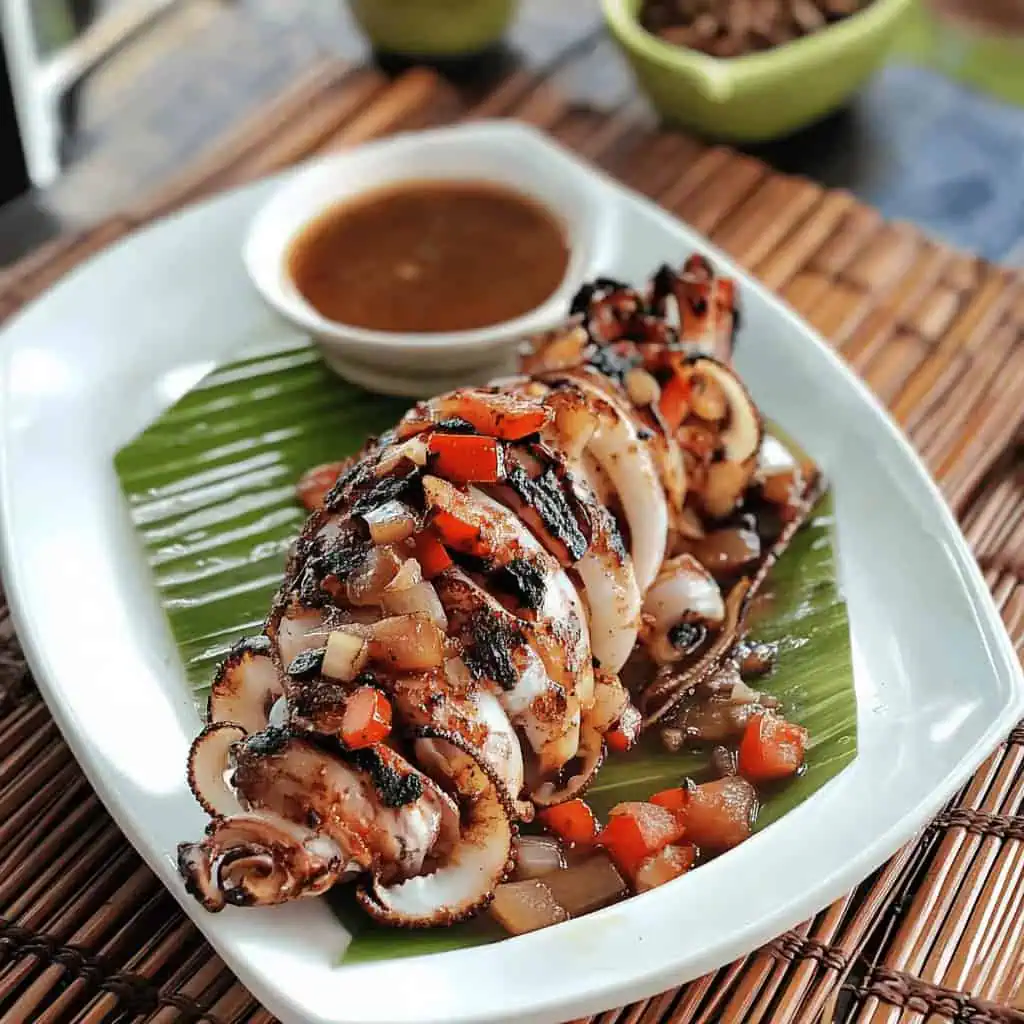
How To Make
1. Prepare the Marinade
In a medium mixing bowl, combine honey, brown sugar, vinegar, minced garlic, ginger, salt, and chili peppers. Whisk thoroughly until the sugar completely dissolves. Divide this mixture into two equal portions – one for marinating and one for basting during grilling. The acid from the vinegar tenderizes the squid while the honey and sugar create that beautiful caramelization.
2. Clean and Prepare the Squid
Hold the squid body in one hand and gently pull the head and tentacles with your other hand. They should separate easily from the tube. Remove the clear plastic-like backbone (quill) by pulling it from the body opening. Carefully remove and discard the ink sac and internal organs.
Rinse the squid thoroughly under cold running water, making sure to clean inside the tube as well. Pat dry with paper towels. Using a sharp knife, score the outside of the squid in a diamond pattern, cutting just halfway through the flesh. This not only creates an attractive presentation but helps the marinade penetrate and prevents the squid from curling during cooking.
3. Prepare the Stuffing
In a bowl, combine the finely diced tomatoes and chopped onions. Season with salt and pepper to taste. Mix well and set aside. These fresh vegetables will release moisture during cooking, keeping the squid tender from the inside.
4. Marinate the Squid
Place the cleaned and scored squid in a shallow dish and pour half of your prepared marinade over them. Ensure the squid is well-coated both inside and out. Cover and refrigerate for exactly 1 hour at 4°C/40°F. Avoid marinating longer as the acid in the vinegar will start to "cook" the squid, resulting in a tough texture.
5. Prepare Your Grill
While the squid marinates, prepare your grill. For charcoal, light the coals and allow them to heat until they develop a white ash coating (about 20-30 minutes). For gas, preheat to high (around 200°C/400°F). Clean the grates thoroughly and oil them to prevent sticking.
6. Stuff and Secure the Squid
After marinating, remove the squid and discard the used marinade. Pat the squid dry with paper towels – this crucial step helps achieve better char marks when grilling.
Carefully fill each squid cavity with the tomato and onion mixture, leaving about a quarter of space at the top as the vegetables will expand during cooking. Secure the openings with toothpicks in a crisscross pattern to keep the stuffing in place.
7. Grill the Squid
Place the stuffed squid on the preheated grill over direct heat. Cook for 3-4 minutes on each side, or until the squid turns opaque white with light char marks. While grilling, frequently baste with the reserved marinade using a brush. The squid cooks quickly – the internal temperature should reach 60°C/140°F, but no higher to prevent toughening.
8. Rest and Serve
Remove the grilled squid and let them rest for 2-3 minutes before serving. This allows the juices to redistribute throughout the meat. Remove the toothpicks, then either slice the squid into rings or serve whole on a platter.
Serve immediately while hot with steamed white rice and a side of spiced vinegar dipping sauce. For an authentic experience, prepare a simple dipping sauce by combining ½ cup vinegar, 3 minced garlic cloves, 2 sliced chili peppers, and a pinch of salt.

Tips from Lola's Kitchen
- Choose squid with clear eyes and a sweet ocean smell - truly fresh squid should never smell fishy or like ammonia
- Pat squid completely dry before grilling for the best char marks and to prevent steaming
- Don't skip the diamond scoring pattern - it helps marinade penetrate and prevents curling on the grill
- Marinate for exactly one hour - any longer and the acid will start "cooking" the squid, making it tough
- Keep the grill very hot and cooking time brief - overcooking is the main cause of rubbery squid
- Let the squid rest for 2-3 minutes after grilling to allow juices to redistribute throughout the meat
- For extra tenderness, soak cleaned squid in milk for 30 minutes before marinating
- Save some marinade from the beginning for basting - never reuse marinade that touched raw seafood
- When stuffing, leave about ¼ space at the top as vegetables expand during cooking
- Use multiple toothpicks in a crisscross pattern to truly secure the stuffing inside
Substitutions
- Squid: If jumbo squid isn't available, use medium-sized squid tubes but reduce the cooking time to 2-3 minutes per side.
- Coconut vinegar: Substitute with rice vinegar, white wine vinegar, or even apple cider vinegar (though this will change the flavor profile slightly).
- Thai chilies: Jalapeños or red pepper flakes work well. Adjust quantity to your heat preference.
- Brown sugar: Muscovado sugar or palm sugar adds depth, but regular white sugar works in a pinch.
- Honey: Substitute with maple syrup or agave nectar for a different but complementary sweetness.
- Red onion: White or yellow onions provide a milder flavor if preferred.
- Roma tomatoes: Any firm tomato variety works; just remove excess seeds if using juicier varieties.
Troubleshooting
Tough, Rubbery Squid
- Problem: Overcooking or marinating too long in acidic ingredients.
- Solution: Keep grilling time short (no more than 3-4 minutes per side), maintain high heat, and limit marination to 1 hour.
Stuffing Falling Out
- Problem: Inadequate securing or overstuffing.
- Solution: Use multiple toothpicks in a crisscross pattern and fill only ¾ of the cavity to account for expansion.
Burning Marinade
- Problem: High sugar content in marinade causes quick burning.
- Solution: Move squid to a cooler part of the grill or create a two-zone fire. Alternatively, reduce sugar in marinade by 25%.
Curling Squid
- Problem: Natural tendency of squid to curl when heated.
- Solution: Ensure diamond scoring pattern cuts about halfway through the flesh, or use metal skewers to keep squid flat during cooking.
Bland Flavor
- Problem: Insufficient marination or basting.
- Solution: Ensure marinade fully coats both inside and outside of squid, and baste frequently during grilling.
Storage & Reheating
Storage
- Cool completely before refrigerating in an airtight container.
- Consume within 2 days for best quality.
- Not recommended for freezing as the texture significantly deteriorates.
Reheating
- Best method: Grill or broil for 1-2 minutes per side just until heated through.
- Alternative: Heat in a cast-iron skillet over medium-high heat for 1-2 minutes per side.
- Avoid microwaving as it will make the squid extremely tough and rubbery.
- Add a light brush of oil when reheating to prevent drying out.
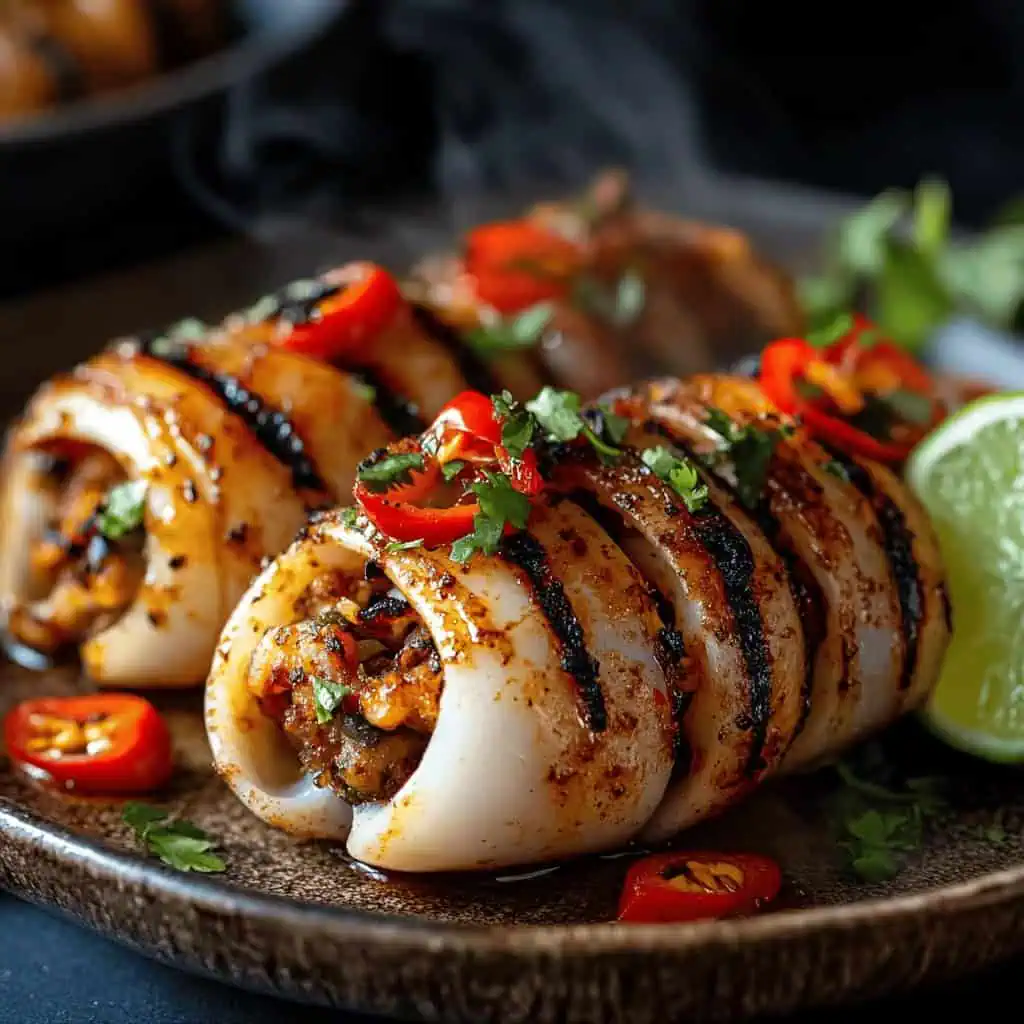
FAQ
How do I select the freshest squid?
Look for squid with clear eyes, a sweet ocean smell (never fishy or ammonia-like), and firm, shiny flesh. The skin should be intact without discoloration. When purchasing cleaned squid, ensure the flesh is translucent and slightly shiny, not dull or yellowing.
Can I make this dish ahead of time?
You can clean and marinate the squid up to 4 hours ahead, but don't stuff until ready to grill. For entertaining, prepare all components separately and assemble just before grilling.
How do I know when the squid is perfectly done?
The flesh should be opaque white with light char marks but still tender when pierced with a fork. If using a thermometer, aim for 60°C/140°F internal temperature. Overcooked squid quickly becomes rubbery.
Can I cook this indoors?
Yes, use a cast-iron grill pan over high heat following the same cooking times. Ensure good ventilation as the marinade may create smoke. A broiler also works well – place 4 inches from heat source and cook 2-3 minutes per side.
Why is scoring the squid important?
Scoring creates more surface area for the marinade to penetrate, prevents curling during cooking, and creates an attractive presentation. The diamond pattern is traditional, but parallel lines work, too.
What's the best way to prevent flare-ups?
Thoroughly pat dry the marinated squid before grilling, and create a cooler zone on your grill where you can move the squid if flare-ups occur. Using a spray bottle with water helps control unexpected flames.
Can this recipe be adapted for smaller squid?
Yes, for smaller squid, reduce cooking time to 2 minutes per side and consider using a finer dice for the stuffing ingredients. You may need to adjust the amount of stuffing per squid.
Related
Looking for other recipes like this? Try these:
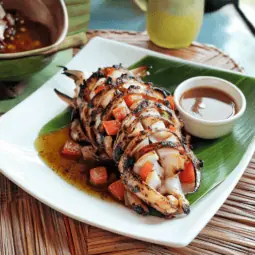
Inihaw na Pusit (Filipino Grilled Stuffed Squid)
Ingredients
For the Squid:
- 2 jumbo squid about 2 pounds total | Pusit
- 2 Roma tomatoes finely chopped | Kamatis
- 1 red onion finely chopped | Sibuyas
- Salt and pepper to taste | Asin at paminta
For the Marinade (Pinagbabaran):
- ½ cup honey | Pulot
- ½ cup brown sugar | Maskobado
- ½ cup vinegar | Suka
- 5-6 cloves garlic minced | Bawang
- 1 thumb-size ginger minced | Luya
- 2 teaspoons salt | Asin
- 3 Thai chili peppers minced | Siling pangsigang
Instructions
- Start by preparing the marinade (Pinagbabaran). In a mixing bowl, combine honey, brown sugar, vinegar, minced garlic, ginger, salt, and chili peppers. Mix well until the sugar completely dissolves. Divide the marinade into two portions – one for marinating and one for basting while grilling. Set aside.
- Clean your squid (Paglilinis ng Pusit) by gently pulling the head and tentacles from the body. Remove the clear plastic-like backbone (balakbak) and discard the ink sac (tintang pusit). Rinse the squid thoroughly under cold running water and pat dry with paper towels. Using a sharp knife, score the outside of the squid in a diamond pattern (guhitan ng diamond pattern sa balat).
- Prepare your stuffing (Paghahanda ng Palaman) by combining the finely diced tomatoes and chopped onions in a bowl. Season with salt and pepper to taste. Mix well and set aside.
- Place the cleaned squid in a large dish and pour half of the prepared marinade over it. Make sure the squid is well-coated. Cover and refrigerate at 4°C/40°F for 1 hour. Do not marinate longer as this can make the squid tough.
- While the squid is marinating, prepare your grill (Paghahanda ng Ihawan). Heat it to high temperature, around 200°C/400°F. Clean and oil your grill grates to prevent sticking.
- After marinating, remove the squid from the refrigerator and discard the used marinade. Pat the squid dry with paper towels. This helps achieve better char marks when grilling.
- Carefully stuff each squid cavity (Paglalagay ng Palaman) with the prepared tomato and onion mixture. Don't overstuff as the vegetables will expand during cooking. Secure the openings with toothpicks to keep the stuffing in place.
- Place the stuffed squid on the preheated grill. Cook for 3-4 minutes on each side, or until the squid turns opaque white and shows light char marks (Pag-iihaw). While grilling, frequently baste with the reserved marinade using a brush (Pagbabrush ng Pinagbabaran). The internal temperature should reach 60°C/140°F.
- Let the grilled squid rest for 2-3 minutes before serving. Remove the toothpicks. Slice the squid into rings if desired, or serve whole.
- Serve immediately while hot with steamed rice (mainit na kanin) and spiced vinegar dipping sauce (sawsawan). You can make a simple dipping sauce by combining vinegar, minced garlic, chili peppers, and a pinch of salt.
- To store leftovers (Pag-iimbak), place in an airtight container and refrigerate for up to 2 days. When reheating (Pag-iinit), use a grill or broiler for 1-2 minutes per side. Avoid using a microwave as it will make the squid tough and rubbery.
Tips from Lola's Kitchen
- Choose fresh squid with clear eyes and a sweet ocean smell
- If using frozen squid, thaw completely in refrigerator overnight
- Soak squid in milk for 30 minutes before marinating for extra tenderness
- Don't overcrowd the grill to ensure even cooking
- Watch for flare-ups from dripping marinade
Nutrition
The Story Behind Inihaw na Pusit (Filipino Grilled Stuffed Squid)
In the coastal regions of the Philippines, where the gentle waves meet pristine beaches, Inihaw na Pusit (Filipino Grilled Stuffed Squid) emerged as a testament to the country's rich maritime culinary heritage. This beloved dish, born from the ingenuity of Filipino fisherfolk, transformed fresh-caught squid into a grilled masterpiece that would eventually grace tables from humble seaside carinderias to upscale Manila restaurants.
Originally a practical way to prepare the day's catch, local fishermen would stuff fresh squid with native aromatics like tomatoes, onions, and ginger – ingredients that grew abundantly in their backyard gardens. The addition of these simple vegetables wasn't just for flavor; it was a clever technique to keep the squid moist during grilling, preventing the common problem of tough, rubbery texture that often challenges seafood cooks.
The marinade itself tells a story of Filipino fusion cuisine, combining indigenous ingredients with Chinese and Spanish influences. The balance of vinegar (a preservation technique dating back to pre-colonial times), sweetness from honey or sugar (influenced by Chinese traders), and the heat from local chilies creates that distinctly Filipino flavor profile that makes this dish unforgettable.
Today, Inihaw na Pusit has evolved beyond its humble beginnings. While beachside vendors still serve it traditionally – fresh off the grill with a simple spiced vinegar dipping sauce – modern Filipino chefs have elevated it with creative marinades and premium stuffing variations. Yet, the heart of the dish remains unchanged: fresh squid, charred to perfection, infused with smoky flavors that transport you straight to a Philippine beach sunset.
Whether enjoyed as pulutan (beer accompaniment) during evening gatherings or served as a special family meal, Inihaw na Pusit embodies the Filipino passion for transforming simple ingredients into extraordinary dishes. Its enduring popularity proves that sometimes the most memorable recipes are those that stay true to their coastal roots while embracing the warm, festive spirit of Filipino dining culture.
The next time you grill this stuffed squid at home, remember you're not just cooking a dish – you're participating in a centuries-old tradition that began on the sun-drenched shores of the Philippine archipelago, where the freshest catch meets the expertise of generations of Filipino cooks. Copy
Remember: Perfect inihaw na pusit isn't just about the stuffing—it's about achieving that delicate balance where the squid is tender and smoky, not rubbery, and the stuffing is cooked just enough to meld all the flavors together while keeping the natural sweetness of the seafood.
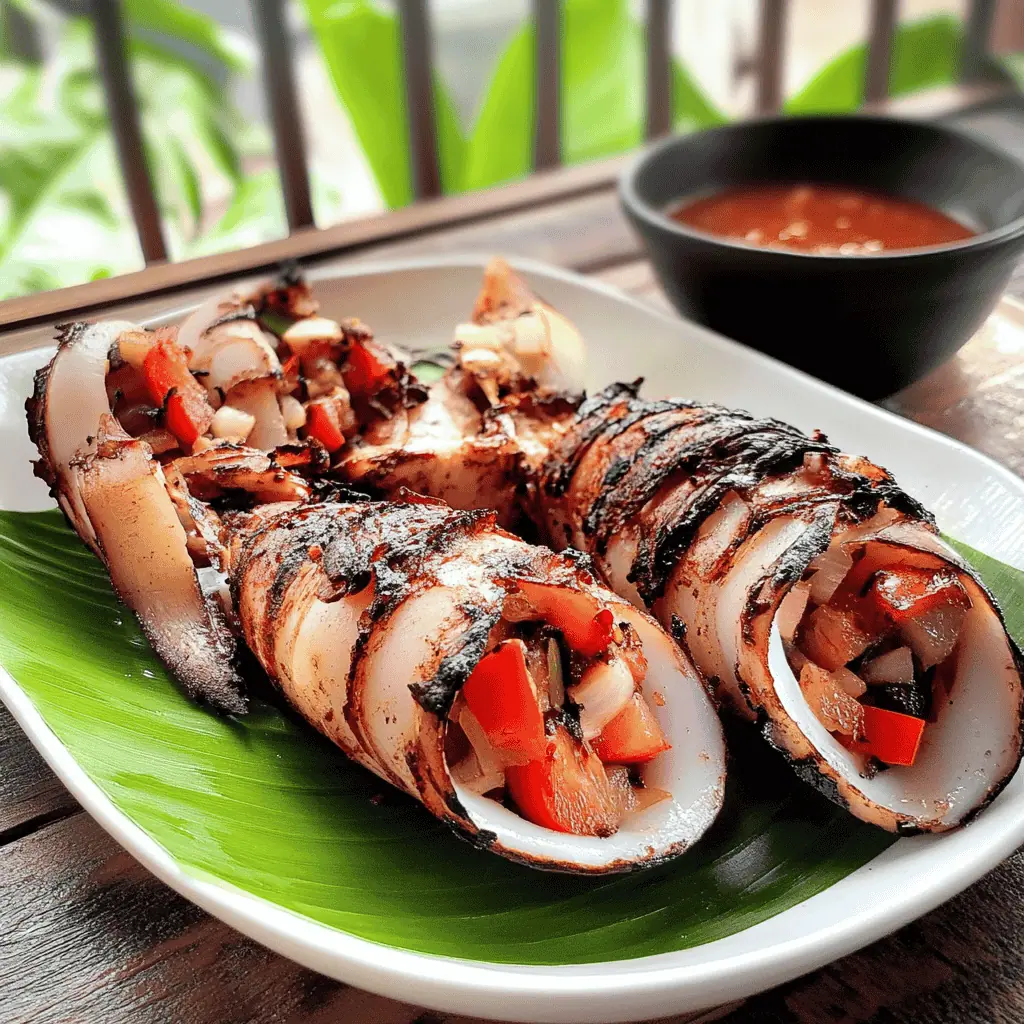

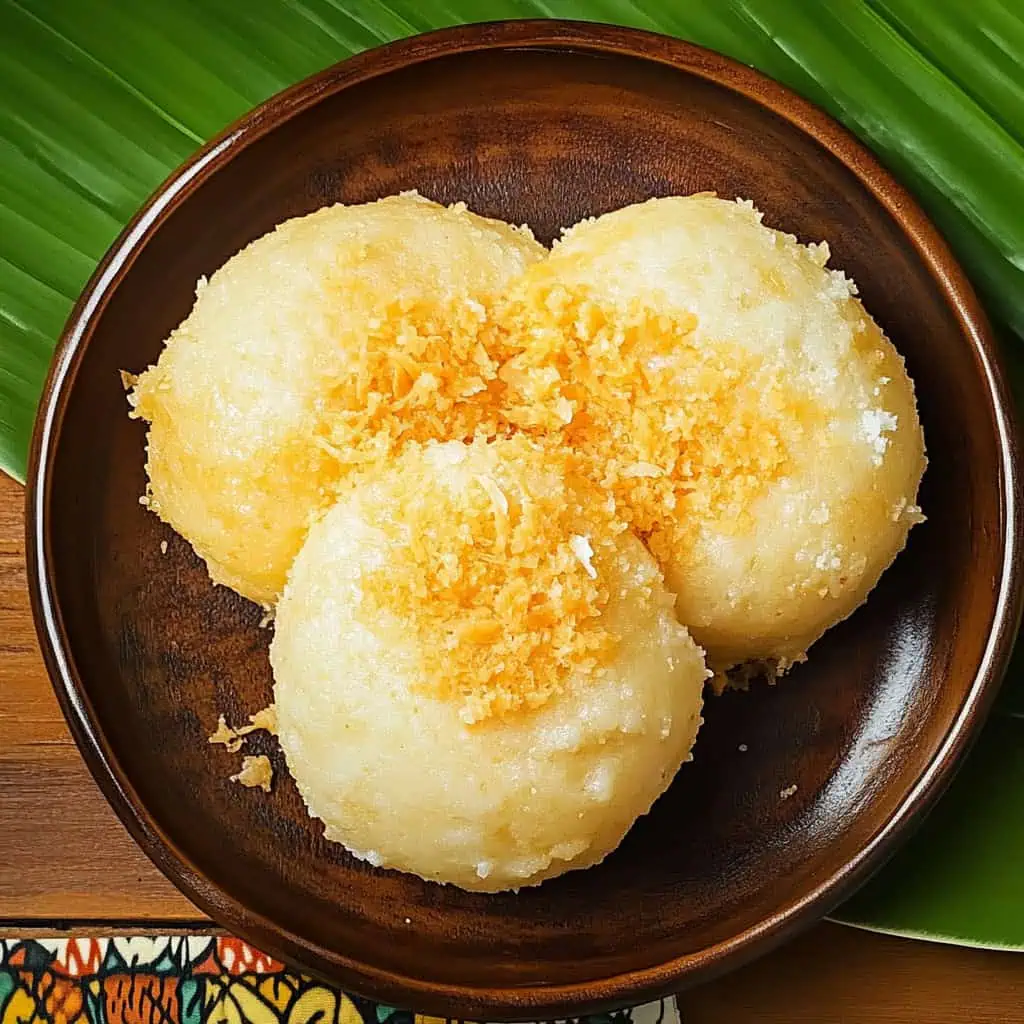
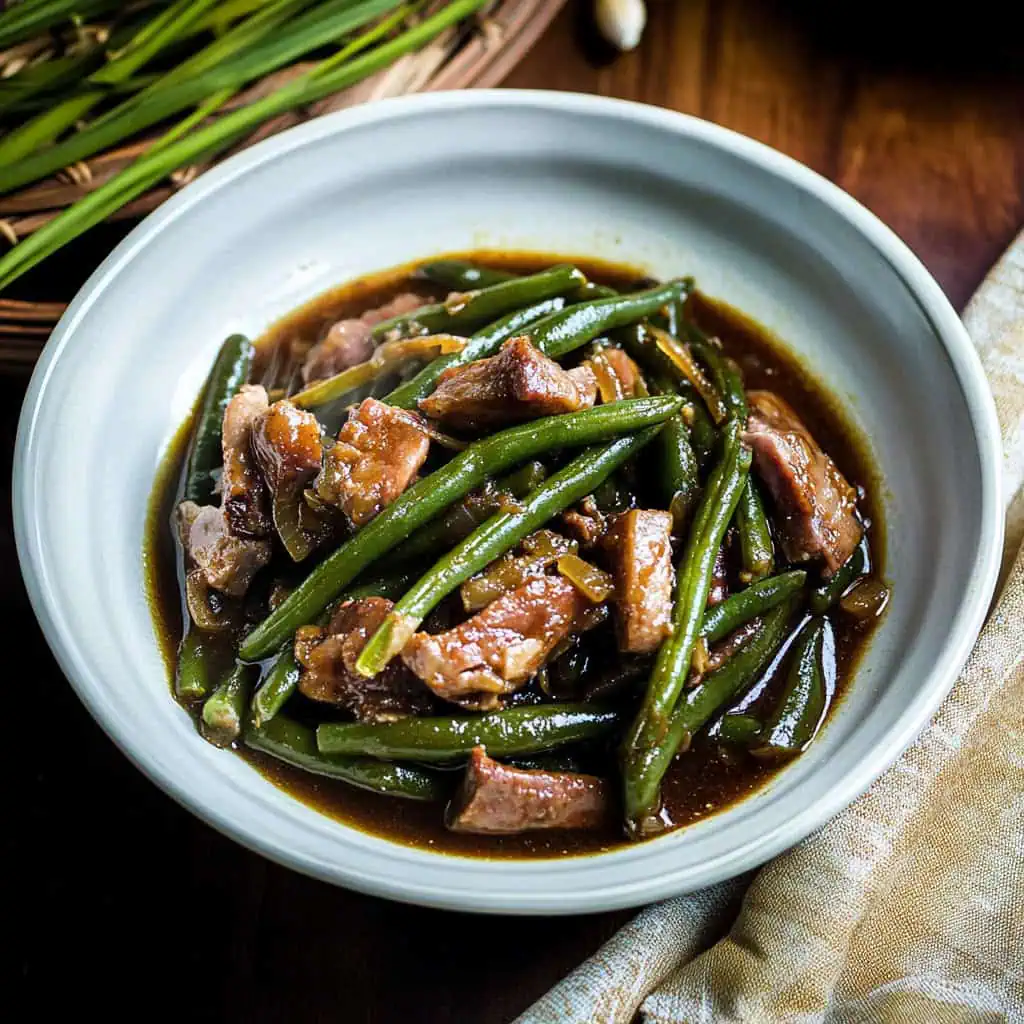

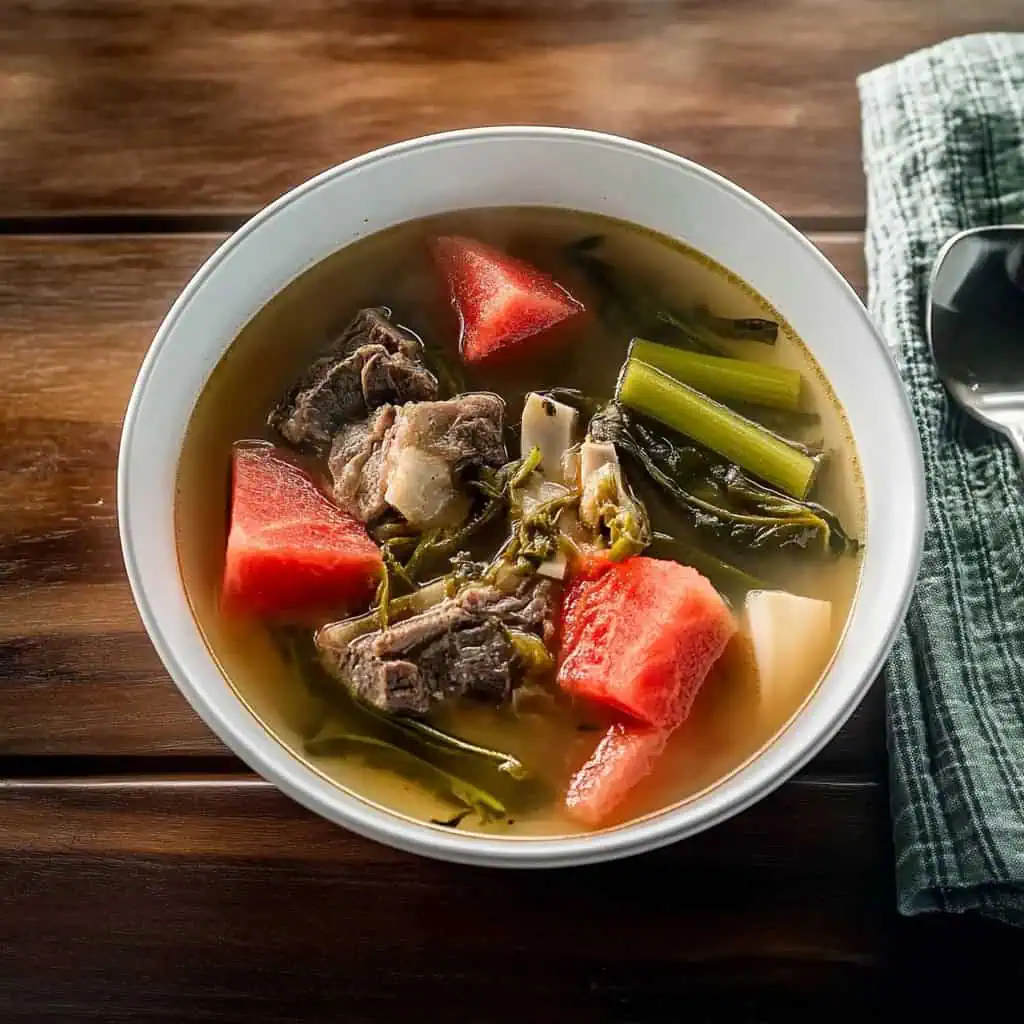


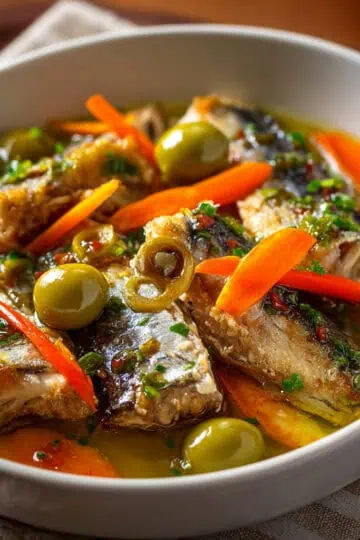

WilliamVeing says
I had trouble cooking at first, but it was very good
Laura S. says
I love the smokey flavor
Stephenetexy says
Thank you for this
Roma says
Tried and tested